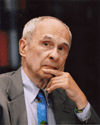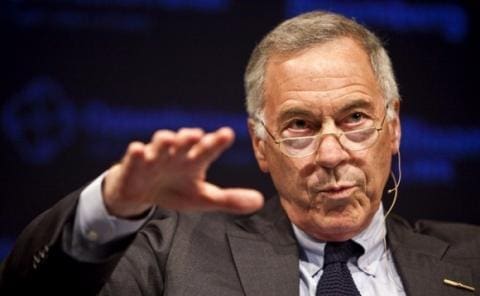To facilitate an understanding of the scope, scale, and focus of the Institute, short biographical sketches of the Institute Co-Directors Galambos, Hanke, and Burgin are presented.
Prof. Louis Galambos

Phone: (410) 243-8049
Email: [email protected]
Louis Galambos is a Professor of Economic and Business History and Editor of The Papers of Dwight David Eisenhower (21 volumes) at The Johns Hopkins University. He is a Founder & Co-Director of the Institute for Applied Economics, Global Health, and the Study of Business Enterprise at The Johns Hopkins University in Baltimore. Prof. Galambos has served as President of the Business History Conference and the Economic History Association. A former editor of The Journal of Economic History, he has written extensively on U.S. business history, on business-government relations, on the economic aspects of modern institutional development in America, and on the rise of the bureaucratic state. His books include Competition and Cooperation: The Emergence of a Modern Trade Association; The Changing Economic Order; The Public Image of Big Business in America, 1880-1940; America at Middle Age; and The Rise of the Corporate Commonwealth: U.S. Business and Public Policy in the Twentieth Century. He is president and a principal of the Business History Group, a consulting organization, and has been a historical consultant to Merck & Co., Inc., Pacific Telesis Group, AT&T, and the World Bank Group.
In addition to editing The Papers of Dwight David Eisenhower, Galambos has edited (with Robert Gallman) the Cambridge University Press series Studies in Economic History and Policy: The United States in the Twentieth Century. At Johns Hopkins University Press, he has edited The Johns Hopkins/AT&T Series in Telephone History and has published extensively on the historical development of America’s telecommunications system and its relationship with the government. He is co-author of The Fall of the Bell System and most recently Anytime, Anywhere: Entrepreneurship and the Creation of a Wireless World.
Prof. Galambos’ major current interest is the process of innovation and its links to the growth of large-scale organizations, professional institutions, and new government programs in the twentieth century. He began this line of inquiry with his analysis of the Bell System and is continuing his research and writing on this subject in a series of studies of the pharmaceutical firm Merck & Co., Inc. He authored the historical section of Values and Visions: A Merck Century, the company’s centennial volume. Also related are three recent books he coauthored that have been published by Cambridge University Press: Networks of Innovation: Vaccine Development at Merck, Sharp & Dohme, and Mulford, 1895-1995; Medicine, Science and Merck; and The Moral Corporation (the last two works were co-authored with Dr. Roy Vagelos, former Chairman of Merck). His study of The Creative Society – and the Price Americans Paid for It was published in 2012 at Cambridge University Press and he co-edited (with Jeffrey Sturchio) Noncommunicable Diseases in the Developing World (Johns Hopkins University Press, 2014).
Prof. Steve H. Hanke

Phone: (410) 516-7183
Email: [email protected]
Twitter: @steve_hanke
Steve H. Hanke is a professor of applied economics and founder and co-director of the Institute for Applied Economics, Global Health, and the Study of Business Enterprise at the Johns Hopkins University in Baltimore.
Hanke is a senior fellow at the Independent Institute in Oakland, California, a senior adviser at the Renmin University of China’s International Monetary Research Institute in Beijing, and a special counselor to the Center for Financial Stability in New York. Hanke is also a contributing editor at Central Banking in London and a contributor at National Review. In addition, Hanke is a member of the Charter Council of the Society for Economic Measurement.
In the past, Hanke taught economics at the Colorado School of Mines and at the University of California, Berkeley. He served as a member of the Governor’s Council of Economic Advisers in Maryland in 1976– 77, as a senior economist on President Reagan’s Council of Economic Advisers in 1981–82, and as a senior adviser to the Joint Economic Committee of the U.S. Congress in 1984–88. Hanke served as a state counselor to both the Republic of Lithuania in 1994–96 and the Republic of Montenegro in 1999–2003. He was also an adviser to the presidents of Bulgaria in 1997–2002, Venezuela in 1995–96, and Indonesia in 1998. He played an important role in establishing new currency regimes in Argentina, Estonia, Bulgaria, Bosnia‐Herzegovina, Ecuador, Lithuania, and Montenegro. Hanke has also held senior appointments in the governments of many other countries, including Albania, Kazakhstan, the United Arab Emirates, and Yugoslavia.
Hanke has been awarded honorary doctorate degrees by the Universidad San Francisco de Quito (2003), the Free University of Tbilisi (2010), Istanbul Kültür University (2012), the Bulgarian Academy of Sciences (2013), Varna Free University (2015), the Universität Liechtenstein (2017), the D.A. Tsenov Academy of Economics (2018), and Universidad Nacional del Este in Paraguay (2024) in recognition of his scholarship on exchange‐rate regimes. He is a distinguished associate of the International Atlantic Economic Society, a distinguished professor at the Universitas Pelita Harapan in Jakarta, Indonesia, a professor asociado (the highest honor awarded to international experts of acknowledged competence) at the Universidad del Azuay in Cuenca, Ecuador, a profesor visitante at the Universidad Peruana de Ciencias Aplicadas (the UPC’s highest academic honor), and the Gottfried von Haberler Professor at the European Center of Austrian Economics Foundation in Liechtenstein, and Professor Honoris Causa at Kolegji AAB in Pristina, Kosovo. In 1998, he was named one of the 25 most influential people in the world by World Trade Magazine. In 2020, Hanke was named a Knight of the Order of the Flag.
Hanke is a well‐known currency and commodity trader. Currently, he serves as chairman of the Supervisory Board of Advanced Metallurgical Group N.V. in Amsterdam and chairman emeritus of the Friedberg Mercantile Group Inc. in Toronto. During the 1990s, he served as president of Toronto Trust Argentina in Buenos Aires, the world’s best‐performing emerging market mutual fund in 1995.
Hanke’s most recent books are Currency Boards: Volume 1. Theory and Policy (2020), Currency Boards: Volume 2. Studies on Selected European Countries (2020), Currency Boards for Developing Countries: A Handbook (2021), Public Debt Sustainability: International Perspectives (2022), The Hong Kong Linked Rate Mechanism: Monetary Lessons for Economic Development (2022), and Did Lockdowns Work? The Verdict on Covid Restrictions (2023).
Hanke received his B.S. in Business Administration (1964) and his Ph.D. in Economics (1969), both from the University of Colorado Boulder.
Hanke and his wife, Liliane, reside in Baltimore and Paris.
